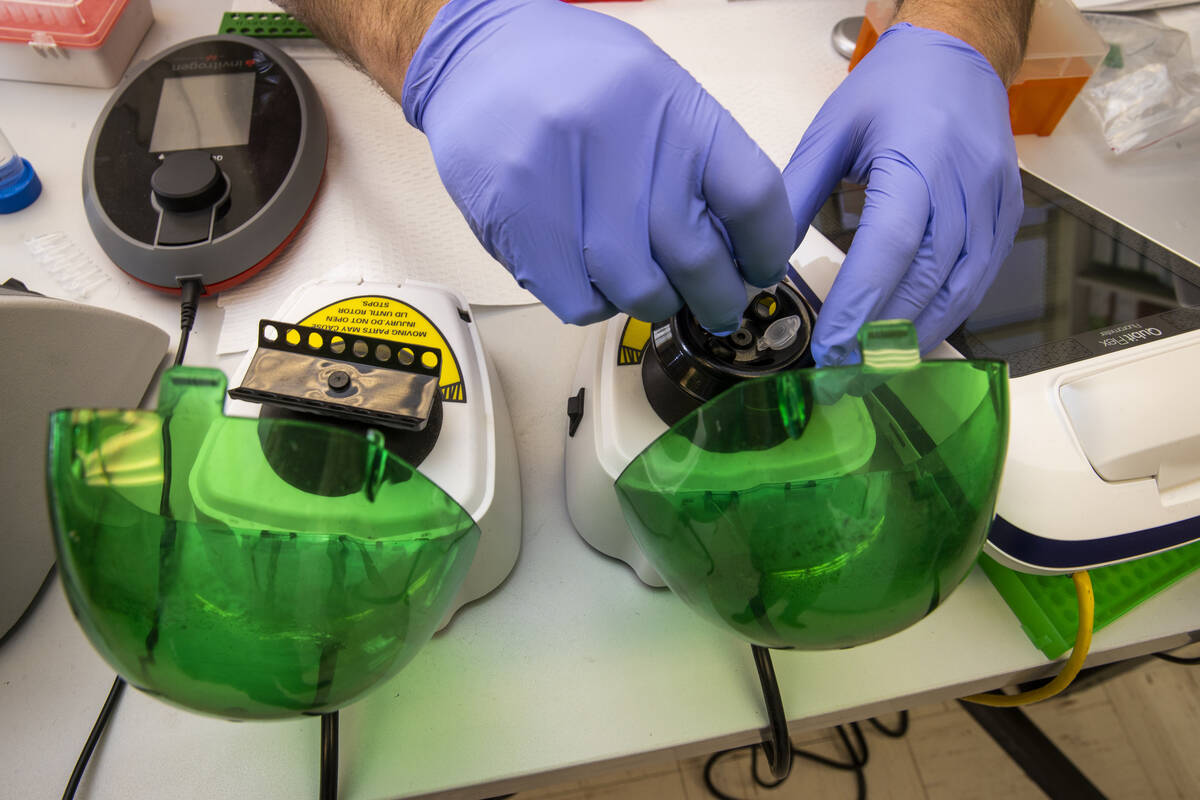About 40 cases of mu coronavirus variant detected in Nevada
There have been roughly 40 cases identified in Nevada of the mu variant of the coronavirus, the latest troubling strain to join the World Health Organization’s watchlist, a top state public health official said.
In designating mu a “variant of interest” on Aug. 30, WHO said it possesses a constellation of mutations that could make it resistant to the protection against disease afforded by vaccination or past COVID-19 infection.
Despite the designation, the head of the Nevada State Public Health Laboratory thinks it’s unlikely that mu (pronounced “mew”) will overtake the highly contagious delta mutant as the state’s dominant strain.
“It got seeded here. It wasn’t a flash in the pan,” lab director Mark Pandori said about mu, first spotted in the state in late April and consistently present until early August. However, his lab at the University of Nevada, Reno now hasn’t detected the newer mu variant in more than 30 days.
“That means that it didn’t survive competition with delta. It didn’t survive vaccination. It didn’t survive masking and social distancing.”
Still, it’s possible that mu could make a comeback, he said.
Labs detect variants through sequencing, a form of genetic analysis conducted on test samples from positive cases.
The 40 or so cases of mu, also called B.1.621, were spotted in five Nevada counties: Clark, Washoe, Lander, Elko and Churchill, Pandori said.
Variant with unique mutation
Cases of the mu variant first identified in Colombia have been found in 42 countries and at least 47 states in the U.S., according to the website outbreak.info, a project of labs at Scripps Research supported by the National Institute for Allergy and Infectious Diseases, the National Center for Data to Health and the Centers for Disease Control and Prevention.
There have been 1,742 cases of mu identified in the U.S., amounting to 0.05 percent of sequenced cases. California leads the nation with 243 cases, the most recent spotted Aug. 16, according to the website.
The WHO said in a bulletin that although the global prevalence of mu is declining, its prevalence in Colombia and Ecuador has consistently increased.
Scientists are focusing attention on the mu variant because of mutations already found in other variants that could make it more contagious as well as resistant to monoclonal antibodies and antiviral therapies, epidemiologist Katelyn Jetelina wrote recently in her coronavirus newsletter.
It also has a mutation that is unique, one that could inhibit the immune system’s B- and T-cell response to the virus, according to Jetelina, an assistant professor at the University of Texas Health Science Center at Houston. “Researchers are quickly studying this change. It could be concerning but it also could be nothing,” she wrote.
Delta descendants ascend
When a new variant is identified, it’s not immediately clear how great a threat it will pose.
“We went from alpha to mu, and only alpha and delta took off,” Pandori said, referencing the letters of the Greek alphabet used to name troubling strains or lineages. The more transmissible alpha variant first identified in the U.K. became the dominant variant in the U.S only to be replaced by the even more contagious delta variant first identified in India.
As the coronavirus continues to evolve as a result of ongoing transmission, he believes a descendent of delta eventually will become the next dominant strain. The delta variant, also called B.1.617.2, accounted for 90 percent of Nevada’s sequenced cases in the past 14 days, according to a Sept. 3 report by the state lab.
“Delta has proven to be extraordinary in its ability to spread,” he said. Through natural selection, strains that evolve from delta may be more deft at spreading.
Delta has so far produced 25 or so descendants. The handful or so identified in Nevada have tripled in the past week, Pandori said, contributing to his theory that a delta descendant eventually will dominate.
“We’ve got a bad situation here, because we’ve got a lot of unvaccinated people that can serve as replication entities for the virus, which drives mutation,” he said. “Yes, vaccinated people can do the same thing, but they do it slower and for a shorter amount of time.”
With many people unvaccinated, the virus continues to rapidly evolve and the pandemic to linger, Pandori said. Constraints on normal living remain.
“There’s a lot of variants because we’re creating them,” he said “And as long as we continue to create these variants, we’re going to continue to live the lives that we currently live.”
Contact Mary Hynes at mhynes@reviewjournal.com or 702-383-0336. Follow @MaryHynes1 on Twitter.











































